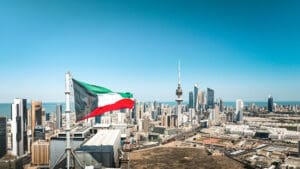Say it quietly: the Gulf is closer now to putting past enmities to bed and unlocking the enormous potential of its youth than it has been at any point in living memory.
The states of the Arabian Gulf are already demonstrating a coordinated muscular foreign policy that reflects the confidence and ambition of its peoples on the global stage.
Iran’s power, the spectre that for years had kept the Gulf’s security establishments on tenterhooks, has been dealt a decisive blow by US strikes in June and Israel’s ruthless wars of attrition against Hamas, Hezbollah and the Houthis.
Although the tragic conflict in Gaza remains unresolved, restrained only by a makeshift peace proposal, Saudi Arabia is reportedly on the cusp of joining the UAE in the Abraham Accords, a move that would seismically realign the politics of the Middle East and herald an era of mutual cooperation between Arab states and Israel.
The wave of optimism sweeping the Gulf was encapsulated by President Trump’s acclaimed visit to Qatar, Saudi Arabia and the UAE in May of this year, announcing a string of AI and investment deals that could transform the region into a hub for technological innovation and wealth.
But amid this flowering of Gulf confidence, one nation has remained conspicuously absent: Kuwait, that one-time Western poster child for the region.
When President George H. W. Bush rallied the international community to Kuwait’s defence against the aggression of Iraq’s Saddam Hussein in 1990, Kuwait rose to become the West’s most steadfast ally in the Middle East. Kuwait was the staging ground for coalition troops ahead of the second Gulf war in 2003, and remains home to several US military bases.
To this day, Kuwait retains the status it received from the US in 2004 as a ‘Major Non-NATO Ally’, the same year it signed a Trade and Investment Framework Agreement, symbols of the close ties it forged with America across two Gulf wars.
Kuwait should, therefore, have been at the forefront of President Donald Trump’s mind as he sought allies in the Gulf to shore up US interests in the region and partners to share in the dynamism of the American tech and AI sectors.
But Kuwait’s leadership has allowed its relations with the United States to wither, threatening to leave the nation a backwater in a region dominated by its more enterprising neighbours: the UAE, Saudi Arabia and Qatar.
The issue centres on the impunity shown by members of Kuwait’s ruling elite towards corruption, which risks becoming endemic. Just one example is former defence minister Sheikh Khaled Al Jarrah, who was sentenced to seven years imprisonment in 2023, accused of embezzling around $800 million from a military assistance firm.
Sheikh Khaled’s successor to the Ministry Sheikh Talal Al Khaled made sure to pick up the mantel – and was convicted this year to 14 years in prison for misappropriating public funds in office.
In fact, corruption has become so pervasive in Kuwait that the Carnegie Endowment’s Bader Al Saif termed it an ‘internal invasion’ – a term not used lightly in a nation that has suffered full-scale armed conflict in living memory.
But to consider the cases that have made it to court is only to scratch the surface of the Kuwaiti corruption quagmire.
Recently leaked documents show that Sheikh Ahmed Meshaal is potentially at the centre of a multimillion-dollar misappropriation of public funds for his own benefit.
As Assistant Undersecretary of the Council of Ministers, Sheikh Ahmed Meshaal signed a consultancy agreement with KGL Investment in February 2013, a highly controversial investment fund that would later be mired in a half-a-billion-dollar embezzlement scandal that saw its two executives imprisoned.
Just over a month later, the Council of Ministers approved a $35 million investment by the government-run Kuwait Ports Authority into KGL Investment – and just a few weeks after that, disgraced senior executive at KGL Investment Saeed Dashti wired Sheikh Ahmed Meshaal $1.4 million to a bank account registered in Panama.
What makes Sheikh Ahmed Meshaal’s case so galling is not just that he is the son of current Kuwaiti Amir Sheikh Meshaal Ahmed. Just a year before the KGL Investment scandal, Sheikh Ahmed Meshaal had been appointed director of the Government Performance Follow-Up Agency – a government organization that officially has oversight over government ministries and public works projects, and in practice has since consolidated its control over state land usage under Sheikh Ahmed Meshaal’s oversight.
The unbridled recklessness of Kuwait’s ruling elite reached a scarcely believable zenith a few months ago, when a government programme to strip naturalised Kuwaitis of their citizenship hit the front pages of the UK’s Financial Times.
The purpose was, of course, to distract from Kuwait’s ailing economy and maintain the illusion that Kuwait can support its generous system of social hand-outs while its rulers strip the public purse for their own benefit.
If Kuwait wants to retain its hard-earned reputation as a reliable Western ally, there can be only one solution: for the ruling elite to turn inwards and address its rampant culture of corruption, rather than launching witch-hunts on law-abiding citizens
If not, key allies such as the US will surely continue to sideline Kuwait in favour of the Gulf’s lower hanging fruits.
In an age where foreign investments and technological exchange are required to compete amid unprecedented global upheaval, Kuwait must urgently address its corruption crisis; or risk becoming a Gulf backwater.
The unbridled recklessness of Kuwait’s ruling elite reached a scarcely believable
